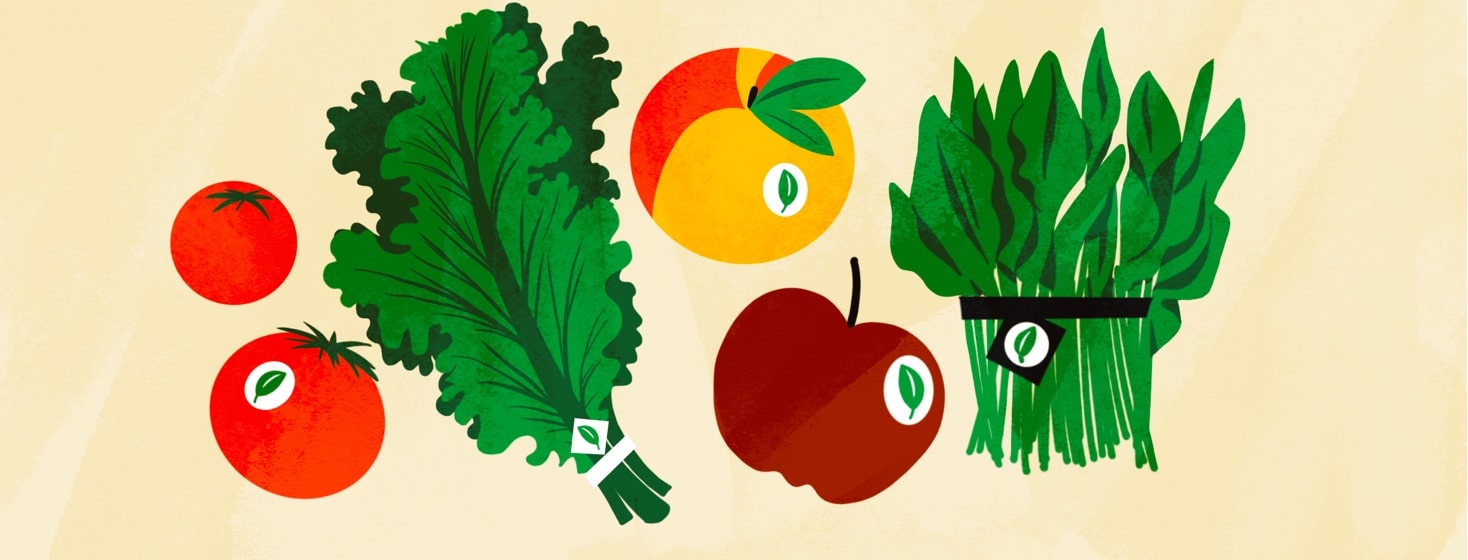A Resolution to Eat Healthy Can Help Your Eyes
After the Holidays many resolve to “go on a diet” and get healthier. Of course, that’s a great idea anytime, however, it may be even more important for those with macular degeneration.
Why is diet important?
Why? Because we want to take every opportunity to do whatever is in our power to slow the progression and if making smart food choices will give us an edge, why would we not want to eat healthier?
Knowledge is power and the wiser we are about the nutrition in food, the healthier our choices will be and the more vitamins/minerals will be available not only for our whole body but for our eyes.
That is why we are going to do a crash course on The Dirty Dozen, The Clean 15, and organic foods, plus the best foods to eat for MD. This is something completely in our control. Taking ownership gives us more power over MD.
Let’s go!
What’s the big deal with eating organic?
It’s more expensive, but there’s more to know about organic food than the price tag! For me, I think of it as spending a little more upfront so I spend less on the backend with costly medical care and prescriptions that might have been prevented by eating healthier. Here’s how organic food is different.
The USDA has developed strict rules and regulations governing organic foods. These foods cannot be genetically engineered (GMO) and must be grown in soil free of synthetic fertilizers and pesticides. When you see the USDA Organic seal, you can be assured you are getting a healthy option and not something grown and sprayed with potentially harmful synthetic chemicals.1
Editor's note: To better understand the USDA Organic label, it's rules, and regulations, please check out U.S. Department of Agriculture's website.
What's the dirty dozen?
Every spring since 2004, the Environmental Working Group (EWG) publishes a list of the Dirty Dozen, fruits and vegetables with elevated levels of pesticides which may be harmful to your health. Below is the 2020 Dirty Dozen list.2, 3
Of course, you want to continue eating a variety of fruits and vegetables, especially those beneficial for MD even though they are on the Dirty Dozen list. Research has shown that foods recommended for MD may slow the progression of advanced MD by as much as 25%.4
Those marked (MD) are highly recommended for individuals with macular degeneration.
DIRTY DOZEN
A way to safely consume produce listed on the Dirty Dozen is to buy organic:2
- Strawberries
- Spinach (MD)
- Kale (MD)
- Nectarines
- Apples (MD)
- Grapes
- Peaches (MD)
- Cherries
- Pears
- Tomatoes (MD)
- Celery
- Potatoes
CLEAN 15 - Lowest levels of pesticides:
However, if it still seems too expensive to buy all organic produce, go with non-organic produce from the CLEAN 15: 3
- Avocados
- Sweet Corn (MD)
- Pineapple
- Onions
- Papaya
- Sweet Peas (frozen)
- Eggplant
- Asparagus (MD)
- Cauliflower
- Cantaloupe
- Broccoli (MD)
- Mushrooms
- Cabbage
- Honeydew Melon
- Kiwi
Other healthy MD options
There are many other foods besides organic and the Clean 15 you will want to include in your diet. The foods listed below are recommended specifically for MD.
- Vegetables: Eat dark green, bright yellow or red vegetables, such as kale, spinach, broccoli, carrots, corn, sweet potatoes, tomatoes, red & orange peppers
- Fruits: Blueberries plus, bananas, apples, oranges, and peaches
- Seafood: Salmon and oysters
- Almonds
- Eggs
- DARK CHOCOLATE - Yes, indulge but use moderation!
What a great way to kick-start a healthier eating plan - eat organic, particularly when eating the Dirty Dozen and create a healthy food plan that incorporates foods recommended for MD. This is one way to take control of your overall health, including your vision!
💜Linda Hoopes, Advocate

Join the conversation